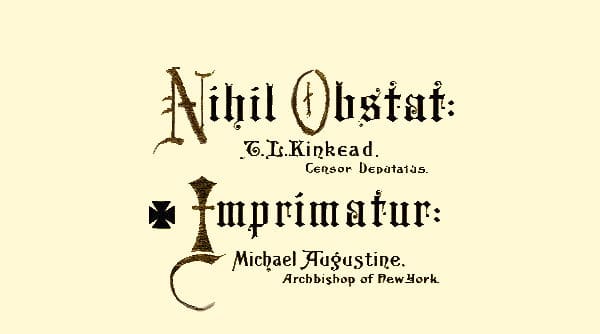Imprimi Potest, Imprimatur and Nihil Obstat:
What are they?
Dear Father John, Do the terms Imprimi Potest, Nihil Obstat and Imprimatur guarantee that some document, some prayer, etc, is approved by the Church and that we should follow it? Do they guarantee there are no errors? I’ve seen some of these designations on some questionable looking  materials; so, I need to know. It seems that these are not as strictly given as they used to be in the past. Are they only as good as the approving authority? In other words, if the approving authority, or staff, doesn’t have strict guidelines on these things, could questionable things get by them? Would you please explain these terms exactly? Thank you.
materials; so, I need to know. It seems that these are not as strictly given as they used to be in the past. Are they only as good as the approving authority? In other words, if the approving authority, or staff, doesn’t have strict guidelines on these things, could questionable things get by them? Would you please explain these terms exactly? Thank you.
“Imprimi Potest” is Latin for “it may be printed.” This refers to the official permission a member of a religious orders receives to publish a work on a religious subject. It implies that the religious superior approves the writing as worthy of publishing. Members of religious orders have a vow of obedience, so they submit major written works to their superiors for approval as part of their vow.
“Imprimatur” is Latin for “let it be printed.” This indicates the approval of a religious publication by a bishop. According to canon law, the bishops have the duty and the right “to demand that writings to be published by the Christian faithful which touch upon faith or morals be submitted to their judgment and have the duty and right to condemn writings which harm correct faith or good morals” (Canon 823). As a result, books that deal with faith and morals need to receive the Imprimatur. Authors can seek this approval either from the bishop where they reside, or from the bishop where the publisher resides.
“Nihil obstat” is Latin for “nothing stands in the way.” This is the stamp of approval given by an official censor to a publication having to do with faith and morals. If a bishop himself doesn’t review a manuscript, then he will delegate a censor to do so. The “nihil obstat” is the censor’s judgment that nothing in the work stands in the way of its being published.
So, in general, yes, having these approvals should assure the Catholic faithful that the content of the books will not cause harm to their faith. Books or other writings approved in this way should not contradict the doctrines of our faith.
Nevertheless, many books that deal with issues of faith and morals also address issues besides simple doctrine. Sometimes they will make recommendations or express opinions that even faithful Catholics can disagree on – the role of emotions in prayer, for example, or how best to prepare children for the sacrament of Confirmation. An Imprimatur doesn’t indicate that these recommendations and opinions are infallible, or even that the bishop agrees with them. It just indicates that the work as a whole is in full harmony with official Catholic doctrine regarding faith and morals.
I guess it is possible (at least in theory) that a religious superior, a censor, or a bishop could make an imprudent judgment about a particular work. One bishop, for example, may give his Imprimatur to a work that another bishop would not. This is because there is always a variety of ways to express or explain our faith – different aspects to emphasize, different characteristics to highlight. I imagine, however, that it would be very rare for a book with an Imprimatur to teach any doctrine that is actually contrary to our faith. If you run into doubtful cases, you can always consult the Catechism or get another opinion from someone you trust. If you find that a book has wrongly, in your opinion, received an Imprimatur, you may want to write to the bishop and alert him, although I think this would be a rare occurrence.
I hope this has helped, at least a little bit. God bless you! In Him, Fr. John
Art: Still life with Bible, Vincent van Gogh, 1885, PD-US, PD-art; Modified sepia of Een voorbeeld van imprimatur en nihil obstat in een boek (An example of imprimatur and nihil obstat in a book), Fouquet, 16 August 2005, PD-US copyright expired; both Wikimedia Commons.





